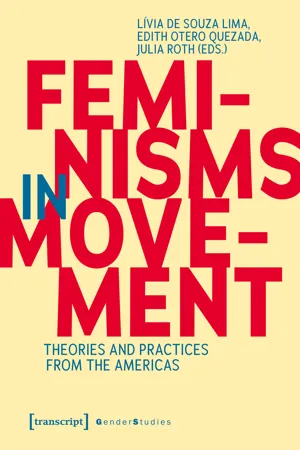
Feminisms in Movement
Theories and Practices from the Americas
- 300 pages
- English
- PDF
- Available on iOS & Android
Feminisms in Movement
Theories and Practices from the Americas
About this book
Feminist movements from the Americas provide some of the most innovative, visible, and all-encompassing forms of organizing and resistance. With their diverse backgrounds, these movements address sexism, sexualized violence, misogyny, racism, homo- and transphobia, coloniality, extractivism, climate crisis, and neoliberal capitalist exploitation as well as the interrelations of these systems. Fighting interlocking axes of oppression, feminists from the Americas represent, practice, and theorize a truly »intersectional« politics. Feminisms in Movement: Theories and Practices from the Americas brings together a wide variety of perspectives and formats, spanning from the realms of arts and activism to academia. Black and decolonial feminist voices and queer/cuir perspectives, ecofeminist approaches and indigenous women's mobilizations inspire future feminist practices and inform social and cohabitation projects.
With contributions from Rita Laura Segato, Mara Viveros Vigoya, Yuderkys Espinosa-Miñoso, and interviews with Anielle Franco (Brazilian activist and minister) and with the Chilean feminist collective LASTESIS.
Frequently asked questions
- Essential is ideal for learners and professionals who enjoy exploring a wide range of subjects. Access the Essential Library with 800,000+ trusted titles and best-sellers across business, personal growth, and the humanities. Includes unlimited reading time and Standard Read Aloud voice.
- Complete: Perfect for advanced learners and researchers needing full, unrestricted access. Unlock 1.4M+ books across hundreds of subjects, including academic and specialized titles. The Complete Plan also includes advanced features like Premium Read Aloud and Research Assistant.
Please note we cannot support devices running on iOS 13 and Android 7 or earlier. Learn more about using the app.
Information
Table of contents
- Cover
- Contents
- Introduction
- Part I Theorizations and Epistemic Dialogues
- Part II Embodied Experiences and Knowledge Productions
- Part III Feminist Conversations
- Contributors